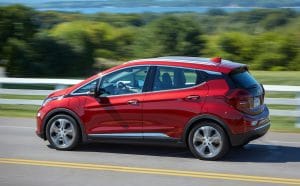General Motors has big plans for its battery-car fleet, with “20 or more” all-electric models due in showrooms by 2023. The list will include new products like the GMC Hummer and Cadillac Lyriq, as well as an update of GM’s first long-range battery-electric vehicle, the Chevrolet Bolt EV.
That refresh is set to go into production roughly a year from now and will be changed by an extended version dubbed the Bolt EUV. Journalists who attended GM’s “EV Day” last March got an in-person look at both versions, but this marks the first time they’ve been teased for the public at large.
GM isn’t revealing much about either, a short blurb accompanying the pics declaring, “Chevrolet offered a sneak peek of its upcoming refreshed Bolt EV and new Bolt EUV during the virtual GM Fleet Solutions Summit. The Bolt EUV will be the first Chevrolet vehicle to feature Super Cruise, the industry’s first true hands-free driving technology for the highway. Both vehicles will go into production in summer 2021.”
(Chevy squeezes 21 more miles out of Bolt battery for 2020.)
The original Chevy Bolt debuted as a 2017 model, so it is clearly due a significant refresh beyond the modest tweaks and slight increase in range it has so far received, taking it from 238 to 259 miles per charge.
What’s in store will be, from what we can make out here, a relatively light freshening of the Bolt’s exterior. The goal is to give it a more sporty look and feel, one that likely will be less geeky than the original. We expect modest changes to the interior, as well, both with new seating and updated instrumentation.
The overall look, based on the prototype shown in March, is more upscale, as well as more high-tech. Among the new features it will get are wireless versions of both Apple CarPlay and Android Auto.
Among other things, expect the 2022 Chevy Bolt to finally get the adaptive cruise control that has become almost an industry norm these days.
The Bolt EUV, meanwhile, will take technology a step further, becoming the first vehicle outside the Cadillac portfolio to get GM’s well-reviewed Super Cruise system. This Level 2 semi-autonomous technology allows a motorist to drive essentially hands-free on up to 200,000 miles of U.S. roadways, mostly limited-access highways. The EUV also will get the latest update to Super Cruise, allowing a driver to pass a slower vehicle simply by tapping on the turn signal stalk.
(GM EV program charging ahead despite pandemic.)
Insiders indicate the updated base Bolt will remain limited to 259 miles between charges. What’s unclear is whether the automaker will adopt a larger battery pack for the Bolt EUV, however. The stretched version of the underlying, skateboard-like chassis could permit the addition of more battery cells.
What we do know is that neither version of the Bolt will adopt the latest platform GM has developed for other BEVs it is working on. That would have to wait until the original model undergoes a complete makeover, something not expected before mid-decade.
At that time, however, Bolt – or a replacement vehicle – would also switch over to the new Ultium lithium-ion batteries GM has developed. They will be produced at a new factory in northeast Ohio that GM is setting up in partnership with its battery supplier, South Korea’s LG Chem. The Ultium cells will have a higher energy density and are also expected to be substantially cheaper to produce.
When Bolt launched, its lithium cells came in at around $145 per kilowatt-hour, according to GM President Mark Reuss. The goal is to cut that to $100 or less.
GM is betting big on battery power, the automaker’s CEO Mary Barra frequently declaring it is “on a path to an all-electric future.” Perhaps, but it will need to work hard to catch up to rival Tesla which overwhelms the current BEV sales charts.
(GM outlines EV plan to cover every brand, product segment and price range.)
On the positive side, Bolt was the third best-selling EV model in the U.S. during the first half of 2019, beating out the Tesla Model S. That said, it lagged well behind the Models 3, Y and X, in that order, Chevy generating just 8,370 sales through the end of June.



